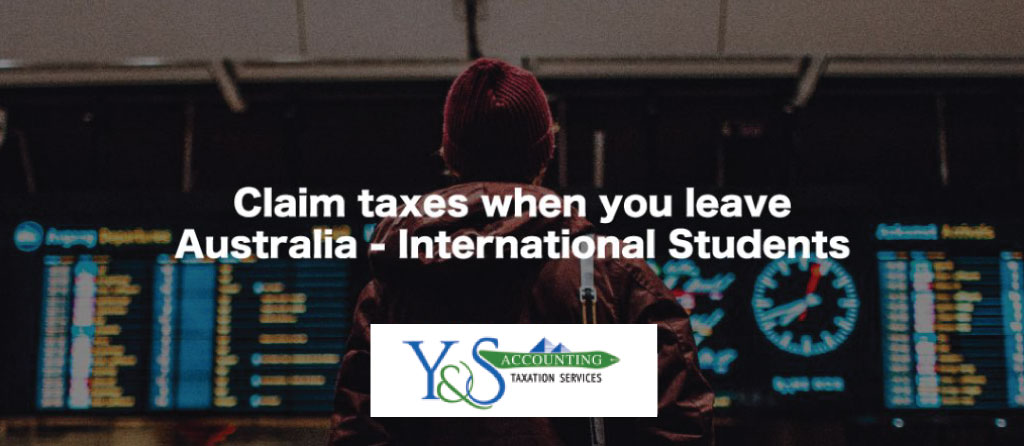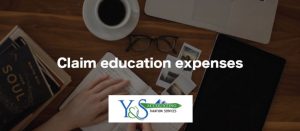Claim Your Taxes When You Leave Australia – International Students

If you’re enrolled to study in Australia in a course that lasts for six months or more, you may be regarded as an Australian resident for tax purposes. This means:
You pay tax on your earnings at the same rate as other residents
You’re entitled to the benefits of the Australian tax system, such as:
- the tax-free threshold (or part of it, if you’re here for only part of the financial year)
- tax offsets
- generally lower tax rates than a foreign resident.
As an overseas student you probably have a temporary visa, which means that you may be a temporary resident.
LODGING YOUR TAX RETURN
If you worked in Australia, you will probably need to lodge an Australian tax return after 30 June. You can lodge your tax return from your home country.
If you are leaving Australia permanently, you may be eligible to lodge an Australian tax return early. In this case, you must lodge a paper return, which takes longer to process.
If you’re leaving Australia before the end of the income year (30 June), you may be able to lodge your tax return early.
The Australian Taxes Office only accepts early lodgement of tax returns for individuals before the end of the income year if you are an international student and you:
- are leaving Australia permanently
- will no longer derive Australian-sourced income (other than interest, dividend and royalty income).
Lodge your tax return during the normal lodgement period (1 July to 31 October) if you:
- are not leaving Australia permanently
- will receive Australian-sourced income (other than interest, dividends and royalties) after leaving Australia
- have a Higher Education Loan Program (HELP) or Trade Support Loan (TSL) debt.
CLAIMING YOUR SUPER
Any super contributions paid by your employer must remain in your super fund account while you are in Australia.
You can claim your super if you:
- were in Australia on an eligible temporary resident visa (but not if you were on visa subclasses 405 and 410)
- had super contributions paid by an employer while you were in Australia.
- have left Australia and your working visa has either expired or been cancelled.
When you meet the above conditions, you can then receive your super entitlements as a departing Australia superannuation payment (DASP).
A DASP is not taxed as a superannuation lump sum benefit but is subject to tax under a final withholding tax arrangement.
Your super fund will deduct this tax. Additionally, a DASP is neither your assessable income nor exempt income.
DEPARTING AUSTRALIA SUPERANNUATION PAYMENT (DASP)
If you have worked and earned super while visiting Australia on a temporary visa, you can apply to have this super paid to you as a departing Australia superannuation payment (DASP) after you leave.
Before submitting your DASP application, check with your employer that they have paid all the super they are required to.
If it has been six months or more since you left Australia, your visa has ceased to be in effect and you have not claimed DASP, your super fund will transfer your super money to the ATO as unclaimed super money.
You may be required to provide certified documents for your DASP claim. It’s much easier to have documents certified in Australia so we recommend you do this before you leave. Check with your super fund to confirm what documentation is required.
AUTHORISING SOMEONE TO CLAIM ON YOUR BEHALF
You can authorise someone else to claim DASP for you. The person you authorise will be able to act on your behalf and update your information, so consider carefully who you allow to represent you.
Your representative will need a written authority from you before they can submit your DASP claim.
You can nominate:
- a tax agent with full registration or conditional tax agent registration with the Tax Practitioner Board for the purpose of claiming DASP.
- a representative if you use a DASP paper form.
Anyone claiming on your behalf using a paper claim form will have to satisfy the holder of your super that they have the authority to make the claim for you. You should check with the holder to find out what documentation they require.
ELIGIBILITY FOR DASP
Generally, you can claim a DASP if the following apply:
- You accumulated superannuation while working in Australia on a temporary resident visa issued under the Migration Act 1958 (excluding Subclasses 405 and 410)
- Your visa has ceased to be in effect (for example, it has expired or been cancelled)
- You have left Australia
- You are not an Australian or New Zealand citizen, or a permanent resident of Australia.
CLAIMING GST AND WET REFUNDS
You may be able to claim a refund of the goods and services tax (GST) and wine equalisation tax (WET) included in the price of goods you bought in Australia. You do this at the airport or seaport when you actually leave.


Recent Comments